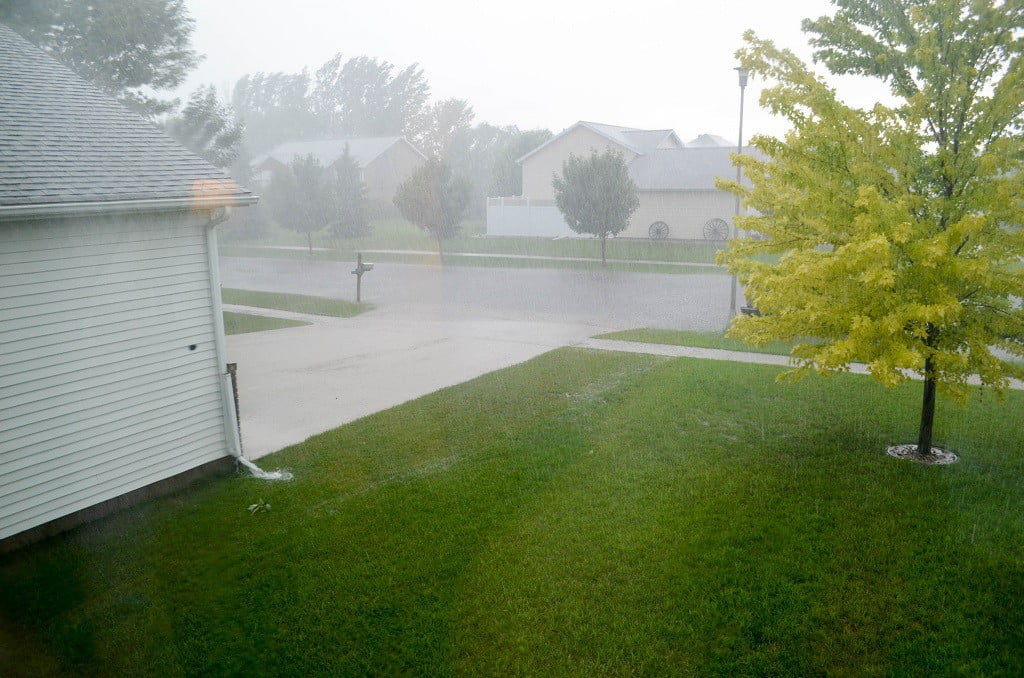As many of us know firsthand, summer storms that produce strong winds and hail can cause a lot of damage in a short amount of time. Wind and the debris it carries can easily damage windows and doors, damage your home’s exterior and even cause damages to personal property. But knowing the risks and taking proactive steps to reduce them before a storm hits can minimize this potential damage.
Here are some of the easiest ways to prepare your home and property before a storm:
1. Protect your vehicle
Vehicles left outdoors during a storm are vulnerable to potential damage from blowing debris and hail. If possible, bring vehicles into the garage or under a covered parking space. If you don’t have access to covered parking, another option is to find temporary shelter such as a parking garage or ramp.
2. Maintain your roof
Roof damage is the most frequent structural loss caused by hail and windstorms. As a homeowner, it’s a good idea to regularly inspect your roof. If there is any previous damage or weak spots, you’ll want to have these addressed before a storm hits and potentially causes greater damage.
Selecting the right materials for your roof is also important. If your roofing materials are not meant to withstand strong winds or hail, you may end up with significant damages.
3. Maintain your trees and shrubs
Trees and shrubbery should be properly pruned—especially the branches directly over your roof or near windows. Strong winds and hail can easily take down weak branches and cause potential structural damages to homes, vehicles, and other property.
4. Secure outdoor property
Secure your outdoor property, like grills, patio furniture, trash cans, and play structures. Leaving these objects unsecured outside during a storm can be dangerous as high winds could blow them over, towards your property, or they could be damaged by hail. If possible, bring these items indoors or tie them down so they are less likely to blow around.
[hr_invisible]
In the Event of a Claim
Given a storm’s unpredictable nature, even despite your best efforts, there may be occasions where your property is damaged. In the event of a loss, you’ll want to follow these steps:
- Protect the property from further damage. If you suspect possible structural, electrical or gas-leak hazards, shut off electrical power, natural gas and propane tanks to avoid fire, electrocution or explosions. Then call the proper authorities and utilities (e.g., gas, electric, telephone).
- If possible, take photos/videos of the damage before having emergency repairs made, such as boarding up windows or covering holes in the roof.
- Assess all of the damage and then call us at 800.277.8742 to report the loss.
- Call a contractor to estimate building damages / auto repair shop to estimate auto damages.
- If your property claim includes loss or damage to personal property, you’ll also want to have your home inventory handy, if you’ve competed one.
- Separate damaged contents from undamaged contents. Do not discard any items until the claims adjuster gives you the authority to do so.
- Keep records of expenses if you are forced to temporarily relocate.
- Do not authorize repairs until the claims adjuster has given you the authority to do so.
- If your property has suffered from severe loss due to a natural disaster, consider contacting a local organization that provides disaster relief.
After we report the claim to the insurance company, the claims adjuster will do the following:
- Contact you by phone or mail to discuss the loss.
- Potentially arrange for an appraiser to inspect extensively damaged property.
- Contact you for a settlement.
If you have any questions about the claims process, our team is here to help. Contact us today!

